Unit2 语法导学案
【教育资料】unit 2what's this in english导学案(4课时)(含答案)学习专用
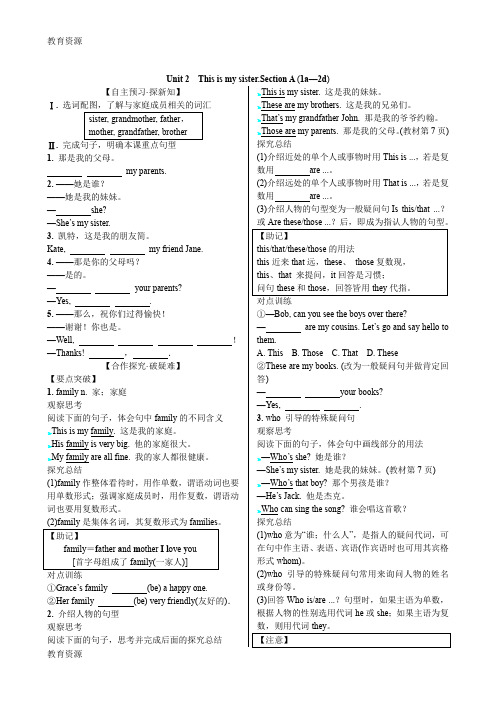
Unit 2This is my sister.Section A (1a—2d)【自主预习·探新知】Ⅰ.Ⅱ. 完成句子,明确本课重点句型1.那是我的父母。
my parents.2.——她是谁?——她是我的妹妹。
—she?—She’s my sister.3.凯特,这是我的朋友简。
Kate, my friend Jane. 4.——那是你的父母吗?——是的。
—your parents?—Yes, .5.——那么,祝你们过得愉快!——谢谢!你也是。
—Well, !—Thanks! ,.【合作探究·破疑难】【要点突破】1. family n. 家;家庭观察思考阅读下面的句子,体会句中family的不同含义This is my family. 这是我的家庭。
His family is very big. 他的家庭很大。
My family are all fine. 我的家人都很健康。
探究总结(1)family作整体看待时,用作单数,谓语动词也要用单数形式;强调家庭成员时,用作复数,谓语动词也要用复数形式。
对点训练①Grace’s family (be) a happy one.②Her family (be) very friendly(友好的).2.介绍人物的句型观察思考阅读下面的句子,思考并完成后面的探究总结This is my sister. 这是我的妹妹。
These are my brothers. 这是我的兄弟们。
That’s my grandfather John. 那是我的爷爷约翰。
Those are my parents. 那是我的父母。
(教材第7页) 探究总结(1)介绍近处的单个人或事物时用This is ...,若是复数用are ...。
(2)介绍远处的单个人或事物时用That is ...,若是复数用are ...。
(3)介绍人物的句型变为一般疑问句Is this/that ...?或Are these/those ...?后,即成为指认人物的句型。
Unit2LookingIntoTheFutureReadingforWriting导学案高中英语人

describe the issue?__________ give an opinion?___________discuss the advantages?________ discuss the disadvantages?______2.What is the type/genre of the text?A. NarrativeB. ArgumentationC. ExpositionD. Practical writing●Read for detailsRead the text and then decide whether the statements on page are true (T) or false (F).1. A person died in an accident while driving a car.2. The Amish avoid new technology because they do not want to have good lives.3. Many disasters have been prevented by weather tracking puter programmes.4. Building large networks through social media helps us find new opportunities.5. The author uses a health monitor to know how much exercise he/she needs.●Read for language featureUnderline the signpost words or phrases in the text. How do they help tell us the purpose of the paragraphs?Step3. Postreading(读后)Group work: discuss the question in groups: Should We Fight New Technology?Step 4.Writing●谋篇布局(文章架构)●Useful expressions词汇短语:1.an increasing number of people 越来越多的人2.in reaction to the phenomenon 针对这一现象3.begin to realize... 开始意识到……4.arouse public concern nationwide引起了全国公众的关注5.along with the development of... 随着……的发展6.it goes without saying 不言而喻7.as far as I am concerned 就我而言8.one of the important disadvantages 最重要的缺点之一9.to make matters worse 更糟糕的是st but not least 最后但同样重要的是11.bee more and more serious 变得越来越严重12.on the one hand...on the other hand... 一方面……另一方面……13.give people more pleasure 给人带来更多的快乐14.the above mentioned reasons 上述原因15.through above analyses 通过以上分析佳句积累:★精彩开头1.There is a widespread concern over the issue that...But it is well known that the opinion concerning this hot topic varies from person to person.有一个广泛引起关注的问题……。
Unit 2 I’m more outgoing than my sister.导学案
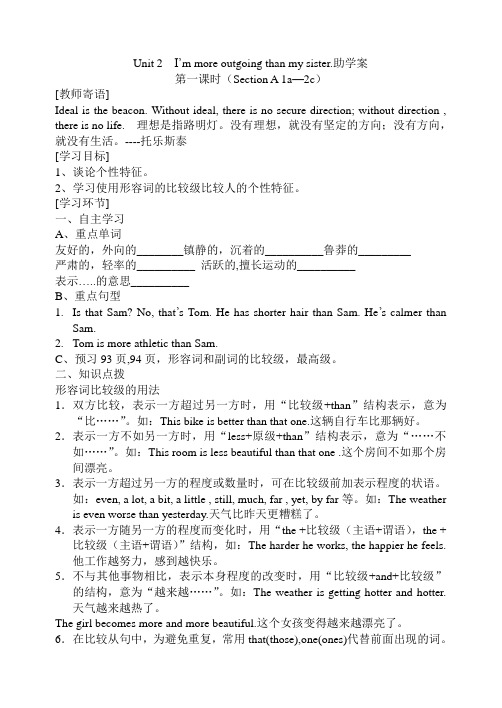
Unit 2 I’m more outgoing than my sister.助学案第一课时(Section A 1a—2c)[教师寄语]Ideal is the beacon. Without ideal, there is no secure direction; without direction , there is no life. 理想是指路明灯。
没有理想,就没有坚定的方向;没有方向,就没有生活。
----托乐斯泰[学习目标]1、谈论个性特征。
2、学习使用形容词的比较级比较人的个性特征。
[学习环节]一、自主学习A、重点单词友好的,外向的________镇静的,沉着的__________鲁莽的_________严肃的,轻率的__________ 活跃的,擅长运动的__________表示…..的意思__________B、重点句型1.Is that Sam? No, that’s Tom. He has shorter hair than Sam. He’s calmer thanSam.2.Tom is more athletic than Sam.C、预习93页,94页,形容词和副词的比较级,最高级。
二、知识点拨形容词比较级的用法1.双方比较,表示一方超过另一方时,用“比较级+than”结构表示,意为“比……”。
如:This bike is better than that one.这辆自行车比那辆好。
2.表示一方不如另一方时,用“less+原级+than”结构表示,意为“……不如……”。
如:This room is less beautiful than that one .这个房间不如那个房间漂亮。
3.表示一方超过另一方的程度或数量时,可在比较级前加表示程度的状语。
如:even, a lot, a bit, a little , still, much, far , yet, by far等。
八年级英语上册 Unit 2 What’s the matter导学案(无答案) 人教新目标版
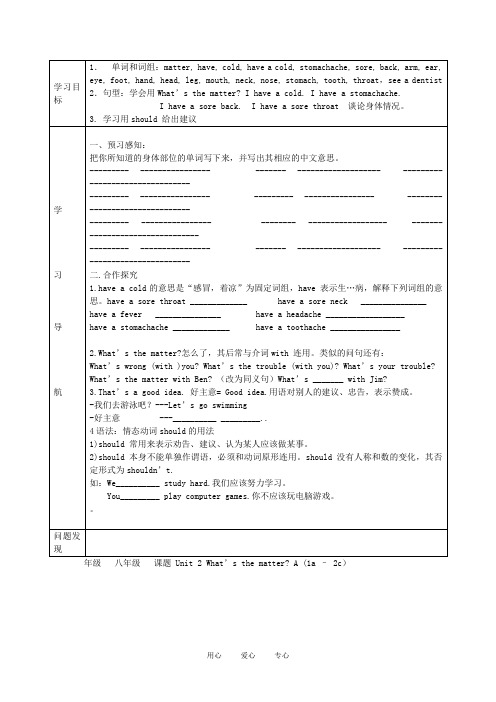
年级八年级课题Unit 2 What’s the matter? A (1a – 2c)年级八年级课题Unit 2 What’s the matter?_A (3a – 4)_年级八年级课题Unit 2 What’s the matter? A (3a – 4)年级八年级课题Unit 2 What’s the matter?_B (1a – 2c)_年级八年级课题 Unit 2 What’s the matter?B(1a-2c)年级八年级课题Unit 2 What’s th e matter?_B (3a –Self Check )_年级八年级课题Unit 2 What’s the matter?B(3a –Self Check)年级八年级课题 unit2单元检测一.根据句意和首字母提示,完成下列单词拼写。
(10分)1. We walk with our l________.2. Yesterday I had a bad c________, so I didn't go to school.3. There is much w________in the river.4. She was very t________, and soon she fell asleep in bed.5. He is very t________, please give him a cup of tea.二.单项选择。
(10分)1. -________-I have a headache.A. What's the matter, Judy?B. Where are you, Judy?C. Who are you?D. What are you doing, Judy?2. He________stay at home and look after his mother yesterday.A. needed toB. mustC. have toD. has to3. I think walking is________our health.A. good atB. bad atC. well inD. good for4. We should not eat________junk food.A. too manyB. too muchC. many tooD. much too5. -How is the young man?-________A. He is twelve.B. He's much better.C. He is a doctor.D. He's Allan.6. It's important to eat a________diet.A. balancedB. balanceC. balancingD. balances7. He often has sports. ________, football, basketball and ping-pong.A. For an exampleB. For exampleC. For the exampleD. For a example8. You should not eat________24 hours.A. something inB. nothing forC. anything forD. everything at9. -My mother is ill.-________A. Don't worry.B. No hurry.C. I'm sorry to hear that.D. OK.10. -I feel stressed out. I have so much work to do every day.-You'd better not work too hard. It's good for you to take some________, I think.A. healthB. exerciseC. lessonD. work三.完成对话。
八年级英语上册Module2 Unit2导学案(2016新外研版)

八年级英语上册 Module 2 Unit2 导学案(2016新外研版)学习目标•学习掌握新单词和短语的拼写和用法;•学习并运用日常对话中典型的情景交际用语;•能够就某一主题进行简短的陈述和问答;•能够正确运用一般现在时和现在进行时;•能够正确使用频率副词表达经常性的行为。
学习重点•单词及短语的拼写和用法;•日常对话中典型的情景交际用语;•一般现在时和现在进行时;•频率副词的使用。
学习内容1.单词和短语:–spell–famous–dictionary–meaning–message–send a message to–on the move–from time to time2.语法和句型:–一般现在时–现在进行时–构成频率副词句子3.情景对话:–Asking for and Giving Personal Information–Talking about Hobbies学习导引单词和短语本单元将学习一些与发送信息和旅行相关的单词和短语。
1.spell:拼写的意思。
例如:Can you spell your name?2.famous:著名的。
例如:The Great Wall is a famous place in China.3.dictionary:词典。
例如:If you don’t know the meaning of a word, you can check it in a dictionary.4.meaning:意思。
例如:What’s the meaning of this word?5.message:消息。
例如:I have a message for you.6.send a message to:发消息给。
例如:He sent a message to his friend yesterday.7.on the move:在旅途中。
例如:My friend is always on the move, traveling from one city to another.8.from time to time:时不时,偶尔。
Unit 2 Let’s go to the cinema on Friday 初中英语学案、导学案

Unit 2 Let’s go to the cinema on Friday.课型:读写课【学习目标】1、熟练掌握本课所学新词汇。
2、能读懂简单的广告类文体,并从中获取重要信息。
3、学会用电子邮件的方式向别人发出邀请;掌握时间地点的表达方式。
【课前准备】1、课前大声朗读下列新单词,注意其音标和汉意,将不会读的圈出来。
magic 魔术show 表演day 日子;白天place 地点price 价格theatre 剧院swimming 游泳come 来2、预习课文,找出下列短语太极拳班__________________ 在花园旅馆_______________在大连体育馆__________________ 魔术表演________________在新时代电影院_______________ 游泳课__________________乒乓球比赛_____________________ 最衷心的祝福_____________3、问题准备:把预习中的疑难问题记录下来。
________________________________________________________________________________________________________________________【课堂活动】Step1、新课导入:1、检查词汇预习,采用小组互查的形式,出现问题让学生及时改正。
2、复习听说课的内容,让学生描述如何发出邀请,提出建议。
然后在小组内练习,再全班交流3、由谈论邀请开始导入新课,最近什么时间什么地点有你感兴趣的节目或赛事?___________________________________________________________________________________________________________________________________ ___________________________________________Step2、泛读训练:1、学生独自阅读短文,了解大意,判断对错。
人教版英语八年级上册 Unit 2 Section A(1a-2e)导学案 (含答案)

人教版英语八年级上册第二单元Unit 2 How often do you exercise?Section A (1a-2d)导学案一、预习目标:1、单词:学习这两页的生词。
2、短语过关:学习关于“做某事的频率”的相关短语。
3、语法:频率副词usually\ often\ sometimes \ never\ hardly ever等。
4、句子过关:How often do you exercise? 你多久锻炼一次?\ I often watch TV. 我经常看电视。
\ I never go shopping. 我从不购物。
\ I watch TV every day. 我每天看电视。
5、积累有关书面表达的句子。
预习导学。
(一)、单词突破——根据下面的提示,写出下列单词的意思。
1、housework ____________2、hardly____________3、ever____________4、hardly ever____________5、once_____________6、twice______________7、Internet_____________8、program_____________9、full________________ 10、swing_____________ 11、swing dance ________________单词讲解:1、housework家务劳动、家务事,不可数名词,常用短语do housework,表示“做家务劳动”。
2、hardly几乎不、几乎没有,表示否定。
3、ever在任何时候、从来、曾经,注意和never(绝不)相区别。
4、hardly ever几乎从不;例如:She hardly ever eats junk food. 她几乎从不吃垃圾食品。
5、once一次、曾经,表示次数;例如:once a month一个月一次。
6、twice两次、两倍,表示次数;例如:twice a year一年两次。
七年级英语Unit2speakup导学案
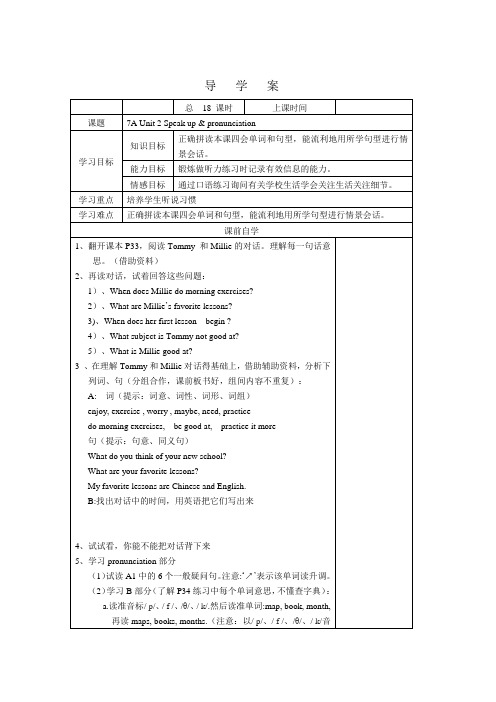
(4)学生跟录音读B1单词,然后操练、检测。
(5)听录音,核对B2答案。
(6)再听录音,跟读B2单词,然后操练、检查。
课堂达标检测
一、做词的填空练习,总结其发音情况.(10’)
1.Daniel often___________me. ( help )
What are your favorite lessons?
What are your favorite activities?
Do you have a good friend at school?
What is he/she good at?
2、听录音,回答问题:
When does Millie do morning exercises?
3)、When does her first lesson begin ?
4)、What subject is Tommy not good at?
5)、What is Millie good at?
3、在理解Tommy和Millie对话得基础上,借助辅助资料,分析下列词、句(分组合作,课前板书好,组间内容不重复):
4、组内朗读操练对话。准备对话示。
6、再次反复读对话,努力把它背下来。
7、学习pronunciation
(1)调查学生A1的阅读情况。(老师解释句型为一般疑问句,其句末读升调。)
(2)听录音。学生跟磁带朗读,检查预习情况,并纠正、示范、领读操练。
6、用你在(5、)中所学发音规则,试读P34B1
7、考考你刚才音标掌握情况。动笔标出P34B2每个单中‘-(e)s’的音标。
课堂交流展示
最新外研英语六上 unit 2 Our favourite festival is the Spring Festival 导学案
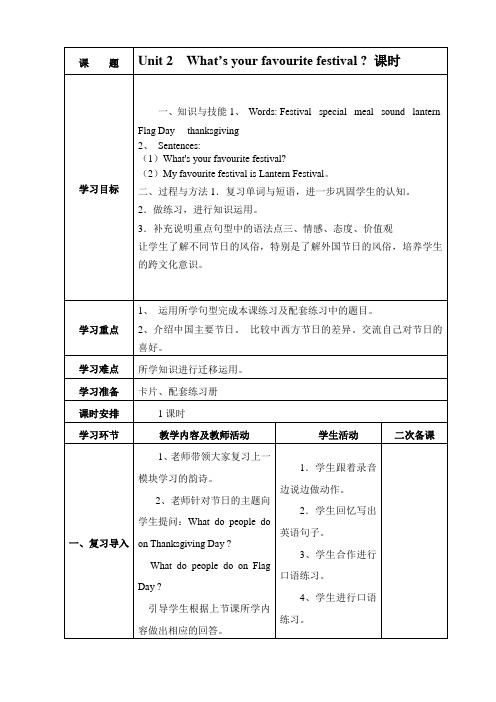
2、学生自主完成练习,教师订正。
3、让学生根据录音中内容填写完成AB第二单元练习1。
三、巩固练习
1、让学生看SB的图片,试着谈一谈图片的内容
1.用英语与同桌交流。
四、小结
放录音,让学生看书听韵诗,从整体上把握诗句意思,讲解学生不熟悉的内容。
学生边看书边学习韵诗。可以跟录音逐句学习。
五、作业
让学生用英语简单介绍关于中秋节的情况。
板书设计
Module 4 Unit 2 What’s your favourite festival?
What’s your favourite festival?
What do people do on Thanksgiving Day ?
What do people do on Flag Day ?
What do people do on Flag Day ?
引导学生根据上节课所学内容做出相应的回答。
1.学生跟着录音边说边做动作。
2.学生回忆写出英语句子。
3、学生合作进行口语练习。
4、学生进行口语练习。
二、新授
1、完成运用任务(1)让学生以SB第二单元活动(2)为示例自己分组展开问答练习。
2、完成运用任务。3、放录音。
教学反思
(2)My favourite festival is Lantern Festival。
二、过程与方法1.复习单词与短语,进一步巩固学生的认知。
2.做练习,进行知识运用。
3.补充说明重点句型中的语法点三、情感、态度、价值观
让学生了解不同节日的风俗,特别是了解外国节日的风俗,培养学生的跨文化意识。your favourite festival ?课时
英语选择性必修一Unit2 Looking into the Future语法将来进行时导学案
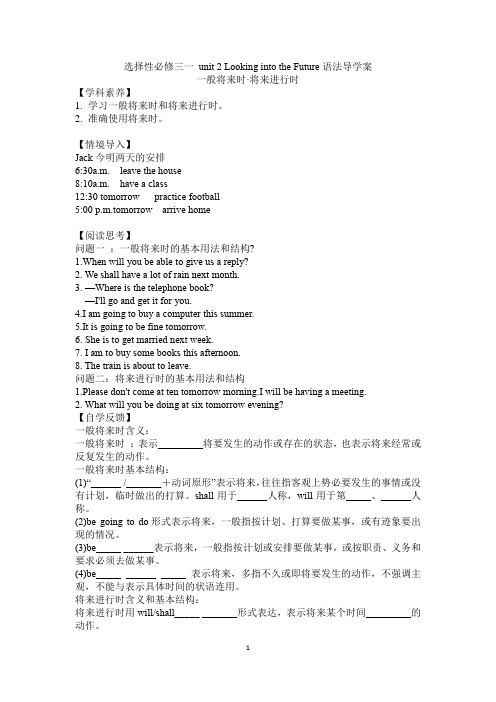
选择性必修三一unit 2 Looking into the Future语法导学案一般将来时·将来进行时【学科素养】1.学习一般将来时和将来进行时。
2.准确使用将来时。
【情境导入】Jack今明两天的安排6:30a.m. leave the house8:10a.m. have a class12:30 tomorrow practice football5:00 p.m.tomorrow arrive home【阅读思考】问题一:一般将来时的基本用法和结构?1.When will you be able to give us a reply?2. We shall have a lot of rain next month.3. —Where is the telephone book?—I'll go and get it for you.4.I am going to buy a computer this summer.5.It is going to be fine tomorrow.6. She is to get married next week.7. I am to buy some books this afternoon.8. The train is about to leave.问题二:将来进行时的基本用法和结构1.Please don't come at ten tomorrow morning.I will be having a meeting.2. What will you be doing at six tomorrow evening?【自学反馈】一般将来时含义:一般将来时:表示_________将要发生的动作或存在的状态,也表示将来经常或反复发生的动作。
一般将来时基本结构:(1)“______ /_______+动词原形”表示将来,往往指客观上势必要发生的事情或没有计划,临时做出的打算。
八年级英语下册unit2whatshouldido导学案

Unit 2 What should I do?Section A (1a-2c)预习案Ⅰ预习导学一、词汇精粹学习建议从课本1a-2c中找出下列单词、短语。
1. 播放2. 争吵;争论3. keep out4. 错误的5. style6.票;入场券7.使惊奇 8.could 9. out ofstyle10. call sb. up 11. 用电话交谈二、听力内容预测(一)牢记P10-P11出现的生词,扫清听力障碍。
(二)观察1a上面的图片和下面的句子,大胆预测:1. What’s the girl thinking in the picture on the top left corner(左上角)?2. What does another girl suggest(建议)to her?3. Should she argue with her parents?三、语法聚焦翻译下列句子。
1.“What’s wrong?”“My clothes are out of style.”2.“What should I do?”“You should say you’re sorry.”3.“What should he do?”“Maybe he should write her a letter.”看一看:1.找出例句1的问句同义句。
2.以上句子中是用哪个单词提建议的,哪一个副词使建议的语气更加委婉?3.将例句2的答语变为否定句。
Ⅱ预习自测一、词汇精粹1. We must have a to watch a movie.2. It’s rude to with others when you have different opinions.3. My son gave me some flowers on Mother’s Day. It really (使惊奇)me.4. The word means“not right”. It is “”5. When a coat is not fashionable,we call it .二、语法聚焦将下列对话搭配起来。
人教版英语八年级上册 Unit 2 Section A (导学案)
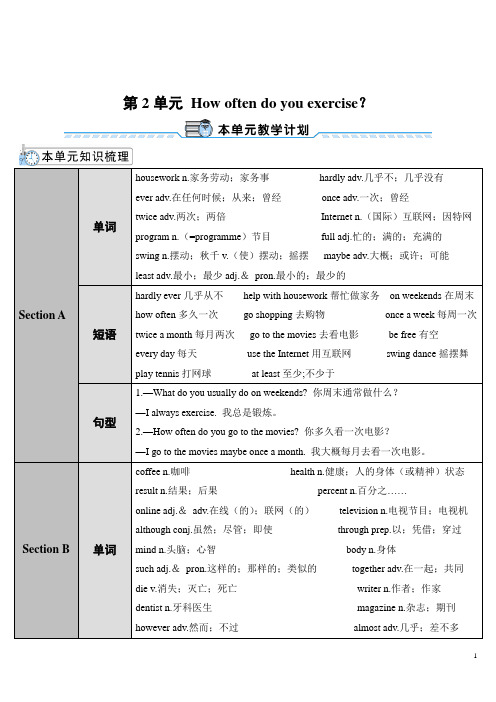
第2单元How often do you exercise?Section A 单词housework n.家务劳动;家务事hardly adv.几乎不;几乎没有ever adv.在任何时候;从来;曾经once adv.一次;曾经twice adv.两次;两倍Internet n.(国际)互联网;因特网program n.(=programme)节目full adj.忙的;满的;充满的swing n.摆动;秋千v.(使)摆动;摇摆maybe adv.大概;或许;可能least adv.最小;最少adj.&pron.最小的;最少的短语hardly ever几乎从不help with housework帮忙做家务on weekends在周末how often多久一次go shopping去购物once a week每周一次twice a month每月两次go to the movies去看电影be free有空every day每天use the Internet用互联网swing dance摇摆舞play tennis打网球at least至少;不少于句型1.—What do you usually do on weekends? 你周末通常做什么?—I always exercise. 我总是锻炼。
2.—How often do you go to the movies? 你多久看一次电影?—I go to the movies maybe once a month. 我大概每月去看一次电影。
Section B 单词coffee n.咖啡health n.健康;人的身体(或精神)状态result n.结果;后果percent n.百分之……online adj.&adv.在线(的);联网(的)television n.电视节目;电视机although conj.虽然;尽管;即使through prep.以;凭借;穿过mind n.头脑;心智body n.身体such adj.&pron.这样的;那样的;类似的together adv.在一起;共同die v.消失;灭亡;死亡writer n.作者;作家dentist n.牙科医生magazine n.杂志;期刊however adv.然而;不过almost adv.几乎;差不多none pron.没有一个;毫无junk n.无用的东西;无价值的东西than prep.&conj.(用以引出比较的第二部分)比less adv.较少;较小adj.&pron.较少的;更少的point n.得分;点v.指,指向短语junk food垃圾食品such as 例如;像……这样more than多于less than少于the answers to ……的答案good/bad habits 好/坏习惯句型1. She says it 's good for my health. 她说它对我的身体有好处。
高一上人教版英语必修1学案Unit2 English around the world学案语法导学案
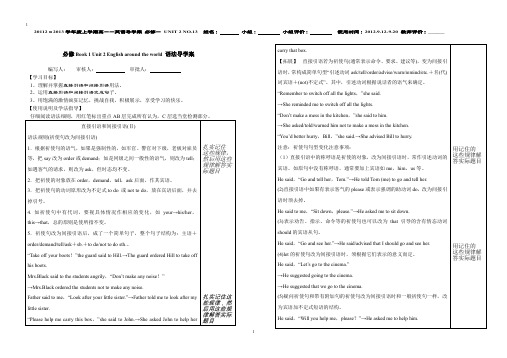
必修Book 1 Unit 2 English around the world 语法导学案编写人:审核人:审批人:【学习目标】1、理解并掌握直接引语和间接引语用法。
2、运用直接引语和间接引语完成句子。
3、用饱满的激情疯狂记忆,挑战自我,积极展示,享受学习的快乐。
【使用说明及学法指导】仔细阅读语法细则,用红笔标出重点AB层完成所有认为,C层选当堂检测部分。
直接引语和间接引语(Ⅱ)语法规则(祈使句改为间接引语)1.根据祈使句的语气,如果是强制性的,如军官、警官对下级,老板对雇员等,把say改为order或demand;如是同级之间一般性的语气,则改为tell;如遇客气的请求,则改为ask,但时态均不变。
2.把祈使的对象放在order,demand,tell,ask后面,作其宾语。
3.把祈使句的动词原形改为不定式to do 或not to do,放在宾语后面,并去掉引号。
4. 如祈使句中有代词,要视具体情况作相应的变化,如your→his/her,this→that,总的原则是使所指不变。
5.祈使句改为间接引语后,成了一个简单句子,整个句子结构为:主语+order/demand/tell/ask+sb.+to do/not to do sth.。
“Take off your boots!”the guard said to Hill.→The guard ordered Hill to take off his boots.Mrs.Black said to the students angrily,“Don’t make any noise!”→Mrs.Black ordered the students not to make any noise.Father said to me,“Look after your little sister.”→Father told me to look after my little sister.“Please help me carry this box,”she said to John.→She asked John to help her 扎实记住这些规律,然后用这些规律解答实际题目扎实记住这些规律,然后用这些规律解答实际题目carry that box.【拓展】直接引语若为祈使句(通常表示命令、要求、建议等),变为间接引语时,常构成简单句型“引述动词ask/tell/order/advise/warn/remind/etc.+名(代)词宾语+(not)不定式”。
人教版高二英语选修六 Unit 2 语法(通)学案(王钊斌)
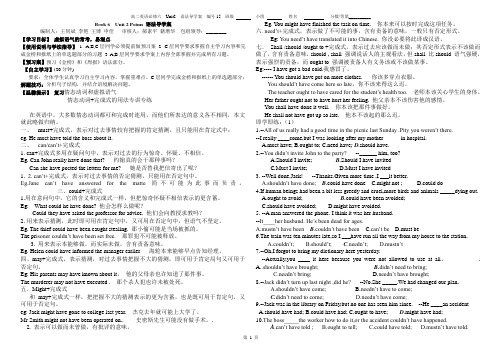
Book 6 Unit 2 Poims 语法导学案编制人:王钊斌李艳王博申佳审核人:郝素平籍增华包组领导:________【学习目标】虚拟语气的常考,易混点.【使用说明与学法指导】1. A,B,C层同学必须提前做预习案2. C层同学要求掌握自主学习内容和完成金榜和报纸上的单选题部分的习题3. A,B层同学要求学案上内容全部掌握并完成所有习题。
【预习案】预习《金榜》和《周报》语法部分。
【自主学习】(20分钟)要求:全体学生认真学习自主学习内容,掌握重难点。
C层同学完成金榜和报纸上的单选题部分;解题技巧:分析句子结构,并结合语境解决问题。
【温馨提示】复习情态动词和虚拟语气情态动词+完成式的用法专讲专练在英语中,大多数情态动词都可和完成时连用,而他们所表达的意义各不相同,本文就此略做归纳。
一、must+完成式,表示对过去事情较有把握的肯定猜测,且只能用在肯定式中:eg. He must have told the boss about it.二、can/can’t+完成式1. can+完成式多用在疑问句中,表示对过去的行为惊奇、怀疑、不相信。
Eg. Can John really have done that? 约翰真的会干那种事吗?Can she have posted the letters for me? 她是否替我把信寄出了呢?1. 2. can’t+完成式,表示对过去事情的否定猜测,只能用在否定句中。
Eg.Jane can’t have answered for the matte简不可能为此事而负责。
三、could+完成式1.用在意问句中,它的含义和完成式一样,但把惊奇怀疑不相信表示的更含蓄。
Eg: What could he have done? 他会怎样么做呢?Could they have asked the professor for advice. 他们会向教授求教吗?2. 用来表示猜测,此时即可用在肯定句中,又可用在否定句中,但语气不坚定。
八年级上unit2英语导学案

白花镇中八年级上期英语导学案主备人:吴利聪审核人:吴利聪学生姓名:上课教师:班级上课时间:2013 年月日学案编号:Unit 2 How often do you exercise?Period 1(Section A 1a—1c)【学习目标】1、熟记运用5个单词:housework、hardly、ever、once、twice2、掌握2个句型①A: What do you usually do on weekends?B: I often go to the movies.②A: How often do you watch TV? B: Twice a week【学习重难点】频率词汇及询问活动频率一般现在时态的熟练运用【学法指导】生活实际与学习紧密联系;培养良好的习惯;加强锻炼,保持健康。
【教学过程】一、预习及检测1.完成下列词汇并写出汉语意义。
___x____ rc____ se ( ) h___ ____ dl_____ ( ) ____ v____ r ( )2. 根据句子和汉语意思,完成句子。
1)她在周末作什么?What _____ she _____ on weekends ?她总是去购物。
She always ______ ______.二、自主学习:Task1:小组对话练习句型:---What do you do on weekends ?---I always do some reading .Task2:完成1a。
---What do you do on weekends ?---I often go to the movie .1. go to the movie2._________ 3 ._________ 4.____________ 5.___________ 6.___________Task3:完成1b。
(1) 了解下列频率副词,写出其汉意always (100%) usually (80%) often (30-50%) sometimes (20%) hardly ever(5%) never (0%) (2)听磁带,完成1b.Task4:小组自主学习,完成1c。
Unit2OutofThisWorldReading课文语法填空改编单元派生词检测导学案-高中英语译

Life on a space station一、词族关联(根据汉语和词性写出单词)1.__________ n. 缺乏,不存在;缺席→__________ adj. 缺席;不存在;心不在焉的2.__________ vt. 占用,使用;居住;占领,侵占;使忙于→__________ adj.使用中,有人使用(或居住);被占领的,被侵占的;忙于→__________ n. 占用,使用;居住;占领,侵占;职业3.__________ vt. 评估,估计,评价→__________ n. 评估,评价4.__________ n. 动物,生物;人→__________ v. 创造,创作;造成,产生→__________ adj. 创造性的,创作的;有创造力的→__________ n. 创造力;创造性→__________ n. 创造;作品5.__________ n. 维护,保养;维持,保持→__________ vt.维持;维修,保养6.__________ n. 面临,遭受;揭露;报道→__________ vt.使遭受;使接触;揭露,揭穿;暴露,显露→__________ adj. 无保护的;无遮蔽的7.__________ adj. 看得见的;明显的→__________ adv. 明显地,易察觉地8.__________ n. 不常有的乐趣(或享受);奢侈品→__________ adj. 奢侈的→__________ adv. 奢侈地9.__________ adj. 永久的,永恒的→__________ adv. 永久地→__________ n.永久,持久性10.__________ n. (__________)宇宙,天地万物→__________ adj. 普遍的,共同的;普遍存在的11.__________ adj. 至关重要的,关键性的→__________ adv. 关键地12.__________ n.天文学家→__________ n. 天文学13.__________ n.基础,根据;地基;创办;基金会→__________ vt. 创建,创办;建立,兴建14.__________ n. 起源,起因;出身→__________ adj. 起初的;原作的→__________ adv. 原来,起初15.__________ n. 发生率,频率→________ adj. 频繁的,经常发生的→________ adv. 频繁地,经常16.__________ n. 原因,动机,目的→__________ vt.成为……的动机,是……的原因;激励,激发→__________ n. 诱因,动机17.__________ n. 投资;投入→__________ v. 投资;投入;授予→__________ n. 投资者18.__________ vt. 计算,核算;预测→__________ n. 计算;预测→__________ n. 计算器19.__________ n. 新闻报道;覆盖范围;信息范围→__________ v. 报道;覆盖,遮盖;行走;包括20.__________ n. 助理;售货员;助教adj. 助理的,副的→__________ v. 帮助,协助→__________ n. 帮助21.__________ adv. 极其,极端地;令人难以置信→__________ adj. 极好的,极大的;不能相信的,难以置信的22.__________ n.沙土,尘土;灰尘,尘埃→__________ adj.布满灰尘的;灰暗的23.__________ adj.固定的,不变的;连续发生的,重复的→__________ adv.始终,一直援助,支持二、词汇解析(朗读版本)1. astronaut n 宇航员astronomer 天文学家astronomy 天文学2. float vi /vt 浮动;漂流;飘动;飘移 A plastic bag was floating in the water.The smell of new bread floated up from the kitchen.3.bother vt 使烦恼使担心bother doing/to do sth 费心做某事bother with/about sth花费时间精力做某事The thing that bother me is •••让我心烦的事是n 麻烦困难(un) save yourself the bother of •••4.occupy vt 占用使用= take up 时间空间占领侵占The capital has been occupied.occupy oneself in doing/with忙于做某事be occupied in doing/with•••使忙于occupation n 工作职业侵占占领5.mosquito cn 蚊子pl. mosquitoes/ mosquitos (同mango)6.microscope n 显微镜microorganism 微生物microbiology n. 微生物学microputer n. 微型计算microfiber n. 超细纤维microchip n. 微芯片microphone n. 麦克风;话筒;扬声器7.exposure n 面临遭遇揭露报道expose vt 暴露显露揭露揭穿~ the truth使面临使遭遇使接触使体验expose sb/sth to...接触遭遇... be exposed to7.in view of 鉴于考虑到•••considering that 鉴于,考虑到…;就…而论given that 考虑到;假定8. furthermore ad 此外再者furthermore,+句子= in addition=besides=what’s more9. vital a =crucial/essential/critical 必不可少的极其重要的play a ~role in•••在•••起关键作用vitally adv. 极其;紧要地;生死攸关地vitality n. 活力,生气;生命力,生动性10. discipline vt 严格要求自己~ oneself + to do sth惩罚=punish ~ sb for •••训练管教~ your chiildn训练纪律自制力训练方法行为准则a. disciplined 训练有素的,遵守纪律的Selfdiscipline n.自律能力;自我约束能力Selfdisciplined a.自律的11. leisure n 休闲闲暇a 闲暇的during ~ time at your ~有空时;空闲时at leisure 悠闲地12. prise vt 包含包括组成构成= consist ofThe class is prised/consists of/is made up of /is posed of 40 students13.scan v 扫描scanned scanning 浏览~ (through)sth ~ the list细看~ his facen 扫描检查快速查阅scanner 扫描仪14. foundation n 基础根据地基创办基金会lay the foundation for 为•••打下基础found vt 创办创建建立15. tale cn 故事fairy tale 神话故事,童话;谎言folk tale 民间故事16. origin n 起源起因originate v 起源;发源;发端于~ in /from..17. motive cn 原因动机目的=motivation the ~ for •••做某事的动机motivate v 是•••的原因be motivated by•••激励激发~ sb to do18. invest vt 投资~ in investment n 投资investor n 投资者vest背心马甲19. calculate vt 计算核算预测calculate on指望;期待calculation n 计算预测calculator计算器It is calculated that•••据估计20. coverage n 新闻报道覆盖范围信息范围cover v 采访报道包含包括跨越行进21 Assistance n 帮助协助援助 e to someone's assistance 来援助某人is of assistance to对…有助with the assistance ofassist vt 帮助~ sb with sth/in doing sth22. shelter n 居所住处庇护vt 保护掩蔽vi 躲避(风雨或危险take shelter from •••躲避….under the shelter of…在…的庇护下shelter sb from •••保护…免遭…shelter from•••躲避(风雨或危险)23. nuclear a 核能的原子能的核武器的~ bomb/war/explosion/industry/power stations24. circumstance cn 条件状况circumstances 境况(尤指经济状况)in/under the circumstances 在这种情况下既然如此in/under no circumstances 决不无论如何不25.absent adj. adj.缺席的;不存在的,缺乏的;be absent from 缺勤;缺席absentminded心不在焉的absence n 缺席缺乏不存在in the absence of缺乏无。
- 1、下载文档前请自行甄别文档内容的完整性,平台不提供额外的编辑、内容补充、找答案等附加服务。
- 2、"仅部分预览"的文档,不可在线预览部分如存在完整性等问题,可反馈申请退款(可完整预览的文档不适用该条件!)。
- 3、如文档侵犯您的权益,请联系客服反馈,我们会尽快为您处理(人工客服工作时间:9:00-18:30)。
Unit2 Grammar 导学案
一、填空
We use _____ to mean “also”.
We use to show a different idea.
We use to show a result.
二、拼写下面专有名词
法国法国的欧洲埃菲尔铁塔罗浮宫巴黎香榭丽舍大街法国阿尔卑斯山
三、用and,but,so 填空。
1.It’s said Yang Liwei will come here tonight, I’m not sure.
2.It was late. She washed her face went to bed quickly.
3.Mr. Zhang felt a little tried, he still went on working.
4.It is going to rain, I took an umbrella with me.
5.Which do you like better, apple pear?
6.Don’t drink too much tea in the evening, you will find it difficult to fall alsleep.
四、选择最佳的答案填空
1.We don’t have enough chairs, some of the students had to sit on the floor.
A. but
B.so
C.or
D.and
2.It was 7:30 p.m, he was still working in the office.
A. and
B.but
C.because
D.so
3.She closed the door went away.
A. and
B.but
C.after
D.so
4.It often takes me a long time to go to school, the traffic in Guangzhou is very busy.
A. and
B.but
C.because
D.so
5.Guilin is famous for its beautiful water and mountains, many tourists go to visit it every year.
A. and
B.but
C.because
D.so
五、完成教材第23页的电子邮件并检查答案,学生纠正。
六、完成本单元C2、D1并检查答案。
